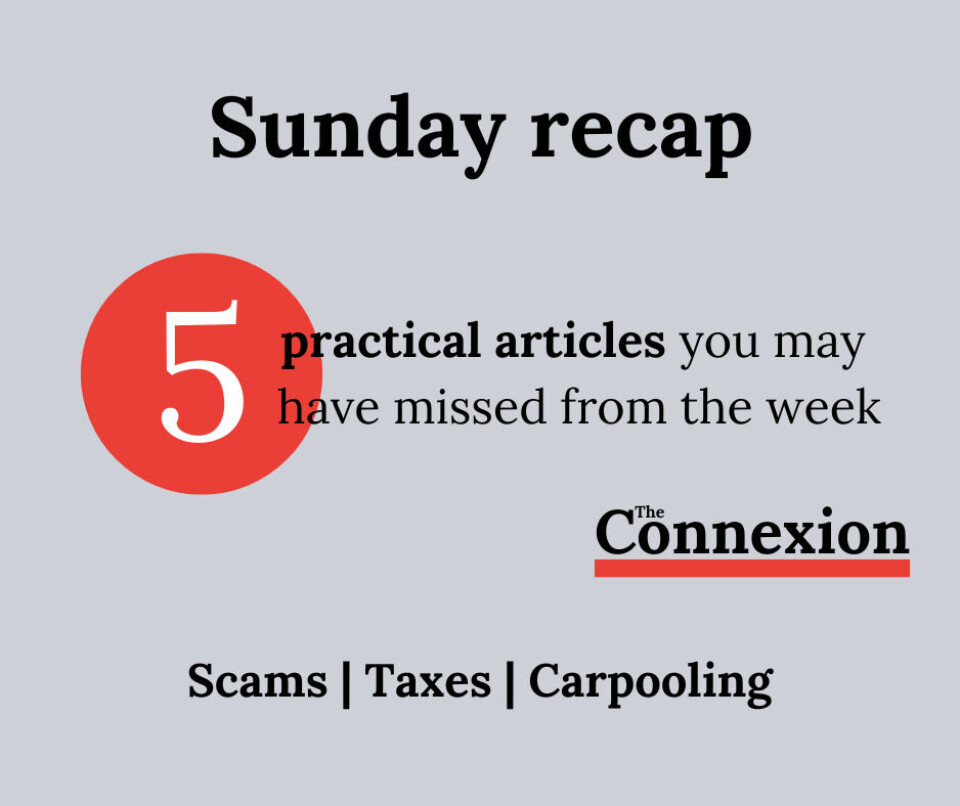-
Identities of 12 million people in France potentially leaked in cyberattack: how to protect yourself
Data is for sale and can be used by scammers for ‘phishing’ fraud
-
When must a bank reimburse a customer scam victim in France?
Reimbursement can depend on whether the customer has been ‘negligent’
-
Fake police steal cash and jewellery during ‘home visit’ in south-west France
Gendarmerie have issued advice on what to do if supposed police officers visit you at home out of the blue
5 practical updates in France you may have missed
We look at new (and not so new) scams, tax bills and their terminology and how thermal imaging cameras are monitoring carpool lanes

1: Scams galore
There were no fewer than three articles about unscrupulous scammers this week, with fraudsters trying to take advantage of victims in a number of ways.
One scam, relating to France’s heatwave, saw victims being sent a fake email for a ‘risk map’ they could purchase, although in reality it was a phishing scam to collect their bank details and personal information.
The other two scams we mentioned were related to cars, with the first being a parking ticket scam attempting to use official looking tickets and a fake website to get people to hand over their cash online.
The second saw fraudsters calling people telling them they needed to replace their windshields due to a (fake) law, before collecting insurance details and pocketing the money for it.
Read more:Warning over scams around obligatory car checks in France
2: Radars check carpooling lanes
As more and more carpooling lanes are rolled out in France – where cars must mainly be carrying at least two people to qualify for use – ways of ensuring the rules are kept to are also increasing.
The installation of thermal imaging cameras to capture heat signals from people inside vehicles is one way and more of such cameras are being installed.
The cameras are pale blue, and have a diamond symbol on them – the same which signals a carpooling lane.
If caught using the carpooling lanes when in the vehicle alone, drivers could be fined up to €135. There are some exceptions which we explain in the link below.
Read more:Radars to catch drivers wrongly using car share lane on rise in France
3: Property tax bills are coming soon
For those who opt to receive their property owner taxe foncière bills via post, the first were sent out on August 22, meaning they will arrive in homes from next week.
For those who opt to receive the bills online - through their personal space on the French tax website (impots.gouv.fr) - bills will be available to view from August 30 if paying the bill in one go.
For those paying monthly, the avis will be available from September 22.
Our article looks at the controversy surrounding steep rises to taxe foncière bills for 2023 – with individual communes able to set their own rates, a number of towns and cities have seen double digit rises to property taxes.
We also explain how you can spread out your payment of the tax into monthly instalments.
Read more:Why French property tax bills, sent soon, will show big increases
4: Free drinking water when out in public
A number of apps can help you find free, clean, drinkable water whilst out and about in France.
The apps cover safe spots ranging from public fountains in larger towns and cities to streams in the countryside and mountains.
One of the apps focuses on how to find safe spots to refill a bottle on popular cycling routes in France and thus avoid having to buy bottled water.
Some of the apps also show the location of carbonated water fountains where bottles can be filled with sparkling not still water.
Read more:How to locate free drinking water fountains near you in France
5: Making sense of tax terminology
Reading a French payslip (or receiving a French tax bill) can be confusing, with the wealth of terminology used to describe different charges, reductions and payments.
Our explainer gives a starting point in deciphering some of the terms used and in particular the difference between a taxe and an împot, as well as showing examples of where these may crop up.
Read more:Impôt, redevance, taxe: understand the subtle differences in French
























